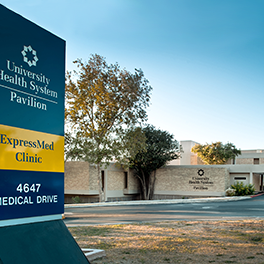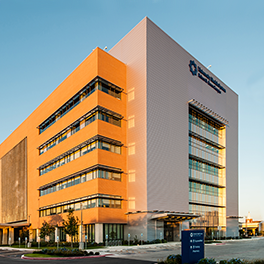Skilled San Antonio Radiologists
University Health offers comprehensive imaging and radiology services to address the unique needs of each patient who comes through our door. Your radiology team includes certified radiologists, imaging technicians and nurses. You can count on us to provide excellent pediatric imaging services for your children, as well.
Our Services
- CT scan, which uses X-rays to make images inside your body
- DEXA, which doctors use to see if your bones are likely to break easily
- fMRI, which scans your brain while your doctor asks you to perform tasks
- MRI, which uses a magnet and computers to create detailed images of your tissues
- PET, which uses radiation, can show blood flow and oxygen use
- Ultrasound, which sends sound waves into your body that bounce off your organs to produce an image
- X-ray, which passes beams of energy through your body to make an image
All of these services are painless and non-invasive. This means you won’t have to stay in the hospital after the test.
Our Specialties
The University Health team of radiologists is composed of experts in every field from pediatric imaging to bone and joint imaging and more. This means that your radiologist has extra training and medical knowledge in a specialty area, giving you more confidence in your diagnosis and treatment.
Our radiologists provide interventional tests and treatment in the following areas:
- Abdominal
- Bone and joint
- Joint pain management
- Bone biopsy
- Brain and spine
- Functional MRI (fMRI): This MRI is done while you perform certain tasks (movement or speech) so your doctor can understand which parts of your brain may be affected by a tumor.
- Myelogram: A myelogram uses contrast dye and either X-rays or a CT scan to look for abnormalities like herniated discs, tumors, and cysts in your spinal cord.
- Brain perfusion: This test shows how much blood is in certain areas of your brain, which can help your doctor understand how your brain is functioning. Your doctor may recommend this test if you have epilepsy, dementia, stroke, or a head injury.
- DATscan: A DaTscan is an imaging test that can help diagnose Parkinson’s disease.
- Cancer
- Tumor ablation: This involves thermal ablation applied directly at tumors using a needle with the aim of killing the cancer cells.
- Chemoembolization: This procedure infuses chemo medicine into the vessel leading to the tumor and also blocks that blood vessel to help shrink the tumor.
- Cardiac
- Calcium scoring: This CT scan shows how much calcified plaque has built up in your coronary arteries. It can help your heart doctor determine how likely you are to develop heart disease.
- Chest and lung
- Lung cancer screening: A low-dose CT scan creates 3-D images of your lungs and may be able to show abnormalities that a chest X-ray cannot detect. It is called low-dose because it only uses a small dose of radiation.
- Pediatric
- Transplant
- Urologic
- Women’s health
- Uterine fibroid embolization: This procedure cuts off the blood supply to the fibroid in the wall of the uterus with the goal of shrinking them.
- Digital mammography: A digital mammogram is created electronically and can better detect breast cancer in pre- and perimenopausal women.
- Digital tomosynthesis mammography: This process creates a 3-D image of your breast using multiple X-ray images. It is relatively new and not available at many other hospitals, but puts less pressure on the breast than traditional mammograms.
- Breast MRI: This exam uses magnets and a computer, not radiation, to create images. It often uses contrast dye to create clearer images to detect cancer and abnormalities in breast tissue
Your doctor may request imaging tests to diagnose a problem. Our specialized radiologists will study your images and work with your doctor to create a treatment plan.
Advanced Radiology Treatments
Our partnership with UT Health San Antonio gives you access to new technologies and clinical trials not available elsewhere. Our innovative approach to your diagnosis and care is unmatched.
Our Procedures
- MRI breast biopsy: Guided by an image of your breast created by an MRI, your doctor will take a piece of tissue from your breast. Then it will be sent to the lab for testing.
- Prostate biopsy: Your doctor will use an ultrasound to guide the needle to the prostate to take a sample. The tissue sample will be sent to the lab for testing.
- Tumor ablation: Doctors use a needle to send heat or intense cold directly to a tumor to kill it. This is minimally invasive, so you won’t have much scarring and don’t have to stay at the hospital.
We also provide interventional radiology with minimally invasive procedures to treat your condition before it gets worse.
Leaders in San Antonio Radiology
We are proud to be on the leading-edge of radiology and imaging technology in San Antonio. With low-dose radiation and fast results, we can safely provide you with the answers you need at locations across South Texas.
Plus, with portable CT scanners that can meet patients where they are, we can perform time-saving scans in critical situations. We also have scanners in key locations at the hospital, such as in the emergency department and surgical units, that are available 24/7.



